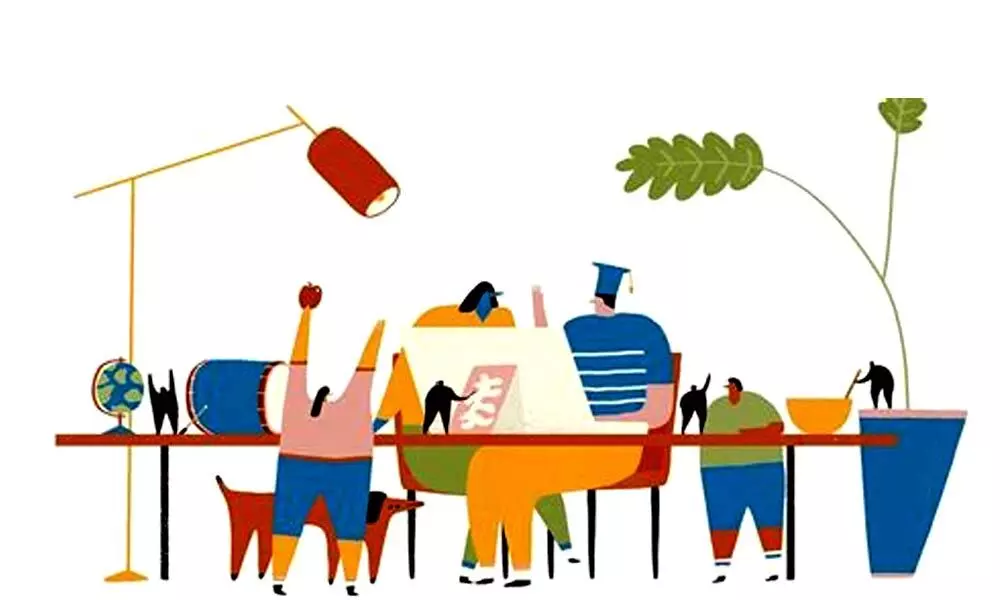Experiences of living in a co-Covid world
The human capacity for burden is like bamboo- far more flexible than you'd ever believe at first glance -Jodi Picoult
image for illustrative purpose

LIVING with a pandemic has become glaringly emblematic of human resilience, as we observe one year of lockdowns imposed to curb the spread of the novel coronavirus. Covid-19 brought our dynamic and effervescent world to a halting screech and in the face of daunting challenges, human society pulled off several strategic measures. While vaccines are available at the moment, the trouble is far from over with mass vaccination and efficacy being contentious matters and the rise of a potential second wave of the viral spread. However, in hope of the crisis ending at a near moment in the future, let us go through significant changes and milestones humanity pulled off while living in a co-Covid world, with the unprecedented adversities of the pandemic.
One of the most significant resurgences for us has been our ability to reconstruct. We have rebuilt almost all structures of social engagement, and taken the time to assess our flaws in the pre-Covid realities. As we came to terms with our co-Covid existence, unimagined ways of survival and resistance were ushered in. The new normal has seen education, work and entertainment to shift to largely online domains and some innovations in this regard are worthy and likely to stay.
Office hours from 9-5 almost seem like a thing of the past with the work-from-home regime firmly in place. As Lewis Dartnell, writing for BBC notes, "What may emerge in the longer term is a more dynamic approach to work, combining office hours where necessary – for team meetings, for example – with remote work for solo tasks. [...] Workers no longer need to remain within commuting distance of the office, but can live wherever most convenient or desirable." This would mean a general decline in troubles related to transportation, time management and the well-being of employees as they could suit their immediate requirements while working. Education is the other arena of digital innovation as classes shifted online, exams were written remotely and projects carried out through a limited reliance on physical presence and interaction. Research and studies did not stop in the face of danger, as technology enabled us to reinvent academic endeavours altogether. As we proceed to bridge digital divides, this could be a gigantic stride in ensuring the accessibility of education to all.
The pandemic also reshaped the meaning of art and entertainment in our lives. Left with ourselves, we were compelled to rely on cinema, television, music and literature to help us stay afloat. It also caused the emergence of innovative and unforeseen creative highs, Artists derived inspiration from the crisis and presented brilliant work to the world. Consumption of art found new ways to manifest itself, as exemplified by Quartz India reporting BookMyShow claiming that they had over 750 content in-home offerings in the first three months of the lockdown. Similarly, performances from across the globe were streamed and made available to a larger audience than the limited numbers accommodated in physical spaces.
There have been noteworthy developments in the arena of healthcare as well, as Covid-19 shed light on problems with existing healthcare regimes. For instance as KPMG notes, traditionally, aged care services had not been seen as a part of the health system. Now, many governments have recognised this oversight and are taking action. With such changes and reconstructions, the post-Covid world seems to be a world with better preparedness to handle social crises in general.
In the more intimate spheres of life, reconstruction and upheaval has been the most evident. While lockdowns caused unprecedented isolation for people and a host of difficult mental health situations, it also provided opportunities to people to reconnect with their lives and rediscover fulfilment. In the absence of immediate mobility, people could reflect on their lives and engage in not just rejuvenating their bonds with people but also in finding individual satisfaction through a number of everyday activities. The time in isolation was utilized for learning new skills, taking stock of one's health and connecting with people. Time spent outside social obligations and professional engagements allowed people to work on themselves. Consequently, post-lockdown contexts saw people continue with healthy routines and a renewed sense of responsibility and attachment with people.
In a survey conducted by Forbes, participants were asked if they would live through 2020 again and a surprising 47 percent said that they would. This is symbolic of the unparalleled opportunity the lockdowns provided despite misery and mental agony. While the struggle seems to continue with the danger of a second wave looming over our heads, we have arguably chased past the most difficult hurdle- the hesitation to restructure our lives when faced with calamity. We currently live with the virus very much around but as our Co-Covid trajectory shows, we will live beyond it. We are a renewed, intrepid and irrepressible society which can reassess, bend and recreate our own fortune. To this end, after one year of the lockdown, we are ready for adversity and primed for a secure and glorious future.
(The author is founder, Upsurge Global, and Senior Advisor, Telangana State Innovation Cell)

